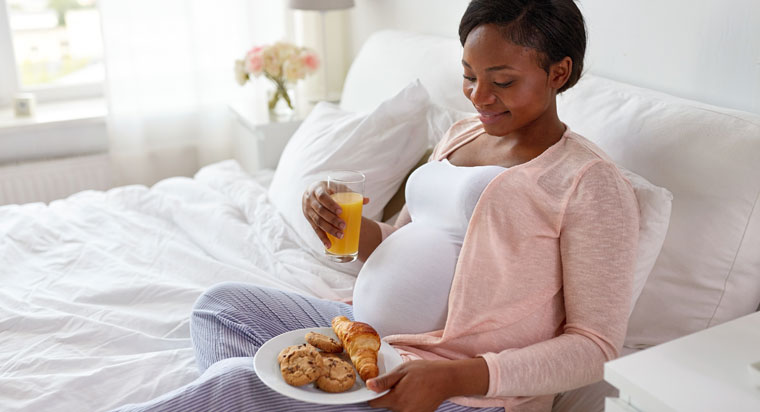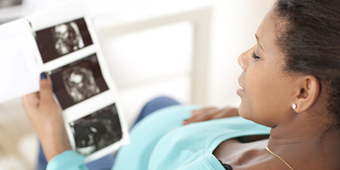What’s With All the Gas During Pregnancy?

Answer a few questions and we'll provide you with a list of primary care providers that best fit your needs.
Your girlfriends might not have prepared you for this: Pregnancy can make you gassy.
Once you find out your baby is on the way, you may start to feel bloated and full around the belly, you may burp more often, and you may – to put it subtly – pass wind more than you’re used to.
All of this can uncomfortable and — ahem — embarrassing.
Why Do Gas And Bloating Increase During Pregnancy?
When you’re pregnant, your body naturally produces more of the hormone progesterone to help nurture your baby. That’s a good thing. But these increased hormone levels also relax the muscles throughout your body, including your intestinal muscles. Because of this, digestion slows down. That means it’s easier for gas to build up. And it’s harder to control the release of gas.
Plus, later in pregnancy, your baby puts added pressure on your abdomen, which can contribute to increased gas.
Should You Be Concerned?
The good news is that this extra gas and bloating cause no harm to your baby. The only harm is, perhaps, to your dignity.
(You can blame it on the baby.)
Can You Minimize Gas And Bloating During Pregnancy?
 Fortunately, the answer is yes. Use these tips to help lessen your discomfort and reduce gas and bloating:
Fortunately, the answer is yes. Use these tips to help lessen your discomfort and reduce gas and bloating:
- Know what foods are your triggers. Some moms find keeping a food diary helpful. If you notice more bloating and gas after eating broccoli and beans, save those for dinner at home rather than lunch at the office. Other foods that commonly cause gas include whole grains, cauliflower, cabbage, asparagus, and Brussels sprouts. Don’t cut out these healthy, fiber- and protein-rich foods entirely because they’re full of good nutrients – for you and your baby. Just watch when and where you eat them, and how much.
- Take your time eating. If you eat quickly, you’re likely taking in a lot of air with each bite. That can settle in your stomach to form gas bubbles and cause bloating. Slow down and chew your food thoroughly. Eating smaller portions can help, too. Plan three small meals with two or three snacks in between.
- Stay away from sugary, carbonated drinks and fried fatty foods. These are all proven gas producers. Limit them in your diet.
- Drink plenty of water. Staying hydrated helps with digestion and can prevent constipation. You’ll take in less air if you drink slowly. Sip. Don’t chug.
- Eat more fiber. Yes, increasing fiber like fruits and leafy green veggies can make you more gassy. But over time, a fiber-filled diet can reduce constipation, which can be a big cause of gas pain. If you’re not already eating a fiber-rich diet, add these foods slowly to your diet to allow your body time to adapt.
- Exercise. In addition to being good for your overall health, exercise helps stimulate digestion.
- Wear loose clothing. Tight-fitting clothing around your mid-section can put added pressure on your abdomen and contribute to gas buildup. Use this as a good excuse to wear loose, comfy clothes later in your pregnancy.
If you’re thinking about starting any medication or herbal supplement to help with gas pain and bloating, talk to your doctor first.
Answer a few questions and we'll provide you with a list of primary care providers that best fit your needs.
Sources: American Pregnancy Association; What To Expect; Medical News Today




